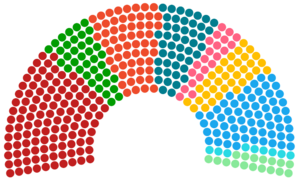Chamber of Deputies of Aredoa
Chamber of Deputies of Aredoa | |
|---|---|
| Type | |
| Type | Lower House |
| Leadership | |
President of the Chamber of Deputies | Emmanuel Ortalez, Aredoan Workers' Party since 28 July 2021 |
| Structure | |
| Seats | 400 |
Political groups | Government (209)
Crossbench (101)
Opposition (92)
|
| Elections | |
Last election | 8 June 2019 |
Next election | Before June 2024 |
The Chamber of Deputies is the lower house, and principal chamber, of the National Assembly of Aredoa, which also includes the Chamber of Regions (the upper house). It consists of 400 members, each known as a Deputy. Deputies represent 81 constituencies and are directly elected for terms not exceeding five years, on the system of proportional representation by means of the single transferable vote (PR-STV). Its powers are similar to those of lower houses under many other bicameral parliamentary systems and it is by far the dominant branch of the National Assembly. As per the Constitution of Aredoa, it has supreme legsislative power and the government must retain the supply and confidence of the Chamber of Deputies to hold office. The Chamber of Deputies has existed continuously since Aredoan independence in 1876 but its powers and provisions have adapted over time, including the introduction of PR-STV as the electoral system in 1997 and the consolidation of the Chambers' legislative supremacy over the upper house following the 16th Amendment to the Aredoan Constitution.
History
Composition
Election
Under the Constitution, Deputies are directly elected for terms not exceeding five years by the electorate of Aredoa under a system of proportional representation known as the single transferable vote. Membership of the Chamber is open to all Aredoan citizens who are aged 18 or older.
The electorate consists of Aredoan citizens (and other long-term residents) over 16 years of age, lowered from 18 in 2009. The President of Aredoa dissolves the Chamber of Deputies at the specified end of the incumbent Chamber's 5 year lifespan when calling a General Election. The Chamber of Deputies may also vote to dissolve itself before the end of its term, in which case the President is constitutionally obliged to dissolve the Chamber and call a General Election.
Constituencies
Deputies represent a grand total of 81 constituencies: 79 mainland constituencies, each electing 5 Deputies each; Islas Malias, electing 3 Deputies; and Gujio Island, electing 2 Deputies. Mainland constituencies are drawn up to be roughly equal in size and redistricting due to population growth is done by an independent, apolitical commission. The number of Deputies was last increased in 1992 from 321 to 400 when all mainland constituencies were adjusted to have 5 Deputies as opposed to 4.
Current Composition
The Government of Aerdoa has 209 of 400 seats in the Chamber of Deputies. 101 Deputies sit on the crossbench while the opposition parties hold 92 seats.
| Party | Seats |
|---|---|
| Aredoan Workers' Party | 112 |
| National Conservative Party | 64 |
| Labour Union Coalition | 59 |
| Vision for the Future | 46 |
| Alliance for a Green Future | 38 |
| Liberal Democratic Alliance | 34 |
| Social Justice Party | 21 |
| Freedom Party | 17 |
| Traditional Values Alliance | 9 |
Powers
The Chamber of Deputies is the supreme legislative chamber due to its role as the chamber of the people, being directly elected. The Chamber of Deputies is often able to overrule or completely bypass the Chamber of Regions in many of its duties, a power strengthened by the 16th Amendment to the Aredoan Constitution. All legislation must be inititated in the Chamber of Deputies; the Chamber can also veto amendments made by the Chamber of Regions.
In addition to its legislative role, it is the Chamber of Deputies that grants confidence to the government and nominates the Chief Minister for appointment by the President. The Chamber of Deputies may bring down a government by passing a motion of no confidence.
The Chamber of Deputies has the exclusive power to:
- Nominate the Chief Minister for appointment by the president;
- Approve the Chief Minister's Cabinet nominees;
- Approve the annual budget and authorise all spending;
- Propose a Constitutional amendment for referendum;
- Ratify treaties; and
- Approve a declaration of war.
President of the Chamber of Deputies
The Chamber of Deputies is presided over by the President of the Chamber of Deputies, who calls the Chamber to order, presides over debates and votes, upholds the rules of the chamber, and disciplines Deputies acting out of order. Under the Constitution, the President of the Chamber of Deputies becomes Acting President of Aredoa if the President is permanently incapacitated until a Presidential Election can be held.
The President of the Chamber is assisted by two Vice Presidents. Typically, the President is a member of the Government, while the two Vice Presidents come from the Crossbench or Opposition benches. The President abstains from voting except to break a tie, but the Vice Presidents may vote on all matters providing they are not presiding over the proceedings.
